Mystery Monday: Have YOU heard of Barth syndrome?
This week Mystery Monday is focusing on Barth syndrome! Thank you so much to Barth syndrome UK for the fantastic resources!
Be sure to stay in the loop with Mystery Monday by following us on Instagram and viewing our latest posts and stories. We also conduct a poll to see how many of you have heard of each rare disease.
What is Barth syndrome?
Barth syndrome is a rare genetic condition that primarily affects males. It is a multisystemic condition characterized by a range of symptoms and abnormalities. One of the key features of Barth syndrome is a dysfunction in mitochondria, which are the cellular powerhouses responsible for generating energy. This results in decreased production of energy-rich molecules called ATP, leading to muscle weakness, fatigue, and growth delays. Individuals with Barth syndrome may also experience cardiomyopathy, which is a weakening of the heart muscle, leading to potential heart failure and increased susceptibility to infections. Although there is currently no cure for Barth syndrome, treatment focuses on managing the symptoms and providing supportive care.
Diagnosing Barth syndrome can be challenging due to its rarity and the variability in its presentation. Doctors should typically look for specific clinical features, such as cardioskeletal myopathy (muscle and heart abnormalities), neutropenia (low white blood cell count), and growth delay. Genetic testing plays a crucial role in confirming the diagnosis, as mutations in the TAZ gene on the X chromosome are associated with Barth syndrome. Since it is an X-linked disorder, females who carry the gene mutation may have milder symptoms or in most cases be asymptomatic carriers.
Living with Barth syndrome can significantly impact an individual’s quality of life and require a multidisciplinary approach to care. Treatment options often include medications to support heart function, physical and occupational therapy to address muscle weakness and motor delays, and nutritional support to ensure adequate growth and development. Regular monitoring of cardiac function, immunizations, and infection prevention measures are also essential. Despite the challenges posed by Barth syndrome, ongoing research and support from medical professionals and advocacy groups offer hope for improved outcomes and potential future therapies.
Do you want to learn more?
Visit www.barthsyndrome.org.uk for excellent additional learning resources.




